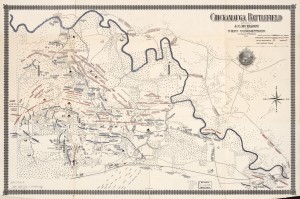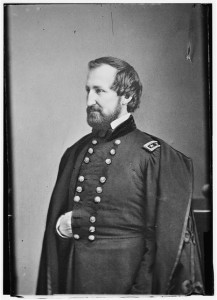Read all about day One at the Battle of Chickamauga at Civil War Daily Gazette. Here’s an early report from the battlefield.
From The New-York Times September 21, 1863:
HIGHLY IMPORTANT.; A Great Battle Fought Near Chattanooga. The Engagement of a Desperate Character. Fierce Dashes on Our Left and Centre. THE ENEMY FINALLY REPULSED. Our Lines Re-established as Before the Fight. THE LOSS IN WOUNDED HEAVY. Official Statement from General Rosecrans. …
HEADQUARTERS OF THE ARMY OF THE CUMBERLAND, CRAWFISH SPRINGS, Ga., Sept. 19.
A desperate engagement commenced this morning at 11 o’clock.
The rebels made a heavy attack on the corps of Gen. THOMAS, forming the left wing of our army, and at the same time they attacked the right wing, which was thought to be a feint.
Gen, MCCOOK’s and Gen. CRITTENDEN’s troops were thrown into the engagement as convenience offered, the main portions of their forces being on the march at the time.
The fight on the left was of a very desperate character. The enemy were repulsed, but, on being reinforced, regained their position, from which they were subsequently driven, after a severe engagement of an hour and a half.
Gen. THOMAS’ forces then charged the rebels for nearly a mile and a half, punishing them badly.
About two o’clock in the afternoon the rebels made a fierce dash on our centre, composed of the divisions of Gens. VAN CLEVE and REYNOLDS.
Gen. VAN CLEVE’s forces were struck on the right flank, and being vigorously pushed by the rebels fell back, until Gen. CARTER’s line was broken and the troops became much scattered.
Gen. THOMAS on the left, and Gen. DAVIS on the [r]ight, then pushed forward their forces vigorously toward the gap, and, after a hard fight, recovered the ground which had been lost on the extreme right.
The fight disclosed the intention of the rebels, which evidently was to get between us and Chattanooga.
The general engagement, which commenced at 11 A.M., ended about 6 P.M.
Gen. PALMER, who had gathered together our scattered forces, and Gen. NEGLEY, who had been sent from the right flank to feel the centre, pushed forward, and reestablished our line as it had been before the battle began, along the Chicamauga Creek.
The country where the battle was fought is level, but thickly overgrown with small timber and brushwood, and is very unfavorable for the use of artillery, very little of which was used.
The casualties in wounded are heavy, but extremely light in killed for so heavy a musketry engagement.
The light [?] on the left was one continuous roll of musketry for an hour or more.
No general officers were injured.
Col, HEG and Col. BRADLEY, commanding brigades, were wounded. [more killed and wounded officers] …
Battery H. of the Fifth artillery, was lost, and afterward recaptured by the Seventy-ninth Indiana regiment.
The battle is not yet over. It will probably be renewed to-morrow.
Rebel prisoners taken represent that the corps of Gens. HILL, POLK, JOHNSTON and LONGSTREET, were in the engagement.
Our men are in the best of spirits, and eager to begin anew.
Special Dispatch to the New-York Times.
WASHINGTON, Sunday, Sept. 20.
ROSECRANS, in a dispatch to HALLECK, says: “In the early part of the fight the rebels drove us some distance, capturing seven guns. Later in the action however, we drove the enemy, reoccupying all our lost ground and capturing ten pieces of artillery. A number of prisoners, representing forty-five regiments, were captured by our forces.” The battle was probably renewed yesterday morning.
News was still leaking back to Richmond slower than in the North, but here the Dispatch editors knew something was up and they retained their editorial optimism about the success of the Southern armies. The Mississippi might be in Yankee hands, but the Confederacy could still regain control of the Ohio. From the Richmond Daily Dispatch September 21, 1863:
A great battle Imminent.
–From the general orders issued by Gen. Bragg to his army it appears certain that a great, and probably a decisive, battle will be fought in a few days, if it has not already taken place. We have every reason to hope, if our troops conduct themselves with their accustomed bravery, that the issue will be favorable to us. For the first time since the beginning of the war we have a superiority of numbers, and our troops are of the best material. If we were able, with 25,000 men, to defeat the enemy, in a strong position with nearly double that number, at Mufreesboro’ we see no cause to doubt the result at this time. A signal triumph in East Tennessee would put the success of our cause beyond the reach of accident. We should, if Rosecrans’s army were destroyed, not only recover East Tennessee, but the whole State, and Kentucky into the bargain, with the complete command of the Ohio river. We should not only prodigiously recruit our own army, but cut off the supplies, in a great measure, from Grants’s, and give it such a fit of the lockjaw that it would be compelled to abandon all thoughts of attacking Mobile. We cannot imagine, indeed, any event which would be so highly beneficial to our cause as the destruction of that army.
Crawfish Spring was named for Cherokee Chief Crayfish. “During the Battle of Chickamauga, September 19-20, 1863, both Union and then Southern soldiers used the spring as a primary water supply. With the Gordon Lee Mansion, located just west of the spring, being used as a field hospital the area around the spring was crowded and busy.”


